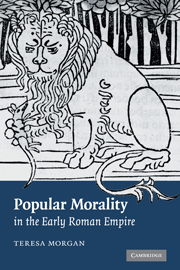Book contents
- Frontmatter
- Contents
- Preface
- List of illustrations
- List of tables
- List of abbreviations
- 1 Introduction
- PART ONE
- 2 Proverbs
- 3 Fables
- 4 Gnomai
- 5 Exempla
- 6 Patterns
- PART TWO
- PART THREE
- Conclusion
- Appendix 1 The political and literary connections of Babrius
- Appendix 2 The definition of a miscellany
- Appendix 3 Popular morality and philosophical doctrine
- List of papyri
- Bibliography
- Index
3 - Fables
Published online by Cambridge University Press: 27 October 2009
- Frontmatter
- Contents
- Preface
- List of illustrations
- List of tables
- List of abbreviations
- 1 Introduction
- PART ONE
- 2 Proverbs
- 3 Fables
- 4 Gnomai
- 5 Exempla
- 6 Patterns
- PART TWO
- PART THREE
- Conclusion
- Appendix 1 The political and literary connections of Babrius
- Appendix 2 The definition of a miscellany
- Appendix 3 Popular morality and philosophical doctrine
- List of papyri
- Bibliography
- Index
Summary
The shell of a nut, though it be hard and tough, affords delight because it holds the kernal; in the same way there lies a doctrine of substantial wisdom, full of fruit, within a fictitious fable.
Robert Henryson, The Moral Fables of Aesop, Prologue 15–18Like proverbs, fables are an unexpectedly elusive genre: while everybody knows one when they hear it, they remain difficult to define beyond dispute. The problem was already recognized in antiquity, and it does not help that neither Latin nor Greek has a single word for ‘fable’, that all the words they use have other meanings and that none can be tied to certain types of fable and not others. They include in Greek, mythos, ainos, ainigma and logos, and in Latin, apologus, apologatio, fabula, fabella and affabulatio.
In many ways, however, the study of fables is easier than that of proverbs, especially in the first and second centuries ce. In addition to fables themselves, there survive several contemporary discussions of the nature of fables. Better still, scholarly study of fables in recent years has familiarized classicists with international fable scholarship, collected and assessed the ancient material, and offered a range of definitions by which to approach it.
In the first century, the rhetorician Theon, dealing with fables as a preliminary exercise in the study of rhetoric (progymnasma), defines the fable (which he calls mythos but explains that other people call ainos or logos) as ‘a fictitious story giving an image of truth’.
- Type
- Chapter
- Information
- Popular Morality in the Early Roman Empire , pp. 57 - 83Publisher: Cambridge University PressPrint publication year: 2007



